Verso Books
Verso Books

Nymph: A Novel
A young woman from a long line of assassins, lives her life with the ardent mission to avoid the trappings of any enduring romantic love, while keeping one on the pursuit of an untimely death for herself.
Not yet thirty, Bathory, or 'Bat' to those near to her, has assembled a peculiar Model, sex worker, linguist and scholar of Latin. But nothing in her lively job history employs the singular traits she inherited from her strange family, chief among them an uncanny ability to sidestep seemingly certain death(s). An appropriate atavistic instinct, for someone from a long line of assassins and spies. Her clan are assassins of a romantic bent, her parents issuing theories on love galore. However Bat is set on swerving any enduring romantic loves, and she's set on dying young. Now, if she could only avoid that one alluring figure from her father's past.
A thriller, a love story, and a dynamic examination of class, violence and connection. The images we make to share and those we strive to conceal, alienation and salvation, magic and technology, LaCava's bold new novel is propelled by the compelling violence one can seed in contradiction.

Moral Abdication: How the World Failed to Stop the Destruction of Gaza
How most Western governments and elites have supported the destruction of Gaza and silenced voices calling for the rights of Palestinians.
Providing a record of the first six months of the war waged by the Israeli army after the 7 October attacks and drawing on a rich range of international sources, Didier Fassin examines how most Western governments have acquiesced in and often contributed to the destruction, by the Israeli army, of Gaza, its homes, infrastructures, hospitals, institutions of education, and civilian population. To justify their support and prevent criticism, they have provided an official version of the events, adopting the Israeli narrative. It was largely taken up by mainstream media, which ignored the experiences and perspectives of Palestinians. Dissenting voices were silenced. A policing of language and thought was imposed. Censorship and self-censorship became normalized.
To call for a ceasefire or to demand the respect of humanitarian law was enough to prompt the ever-ready accusation of antisemitism. Exploring the multiple dimensions of the extreme inequality of lives between the two sides of the conflict and analyzing the complex geopolitical, economic and ideological stakes that underlie it, Fassin intends to constitute an archive of this moral abdication. In his view, the abandonment of the values and principles proclaimed by Western elites to be foundational will leave a deep scar in the history of the world.

Resisting Erasure: Capital, Imperialism and Race in Palestine
Adam Hanieh, Robert Knox and 1 more
A materialist analysis of the links between global capitalism, energy politics, and racial oppression in Palestine.
Why has Palestine become a defining fault line of contemporary politics?
Challenging mainstream narratives that reduce Palestine to ancient hatreds, humanitarian tragedy, or legal abstractions, Resisting Erasure places Israeli settler-colonialism within the broader historical arc of imperialism, race, and fossil capitalism in the Middle East.
Resisting Erasure is a succinct and far-reaching critique of the socio-economic and political forces that sustain the Israeli settler-colonial project. An essential introduction for anyone looking to understand what Palestine reveals about the world – and what it demands of us today.

Hermaphrodite Logic: A History of Intersex Liberationv
How the intersex liberation movement exposed medical harms and became an inspiration to rethink sex and gender.
Hermaphrodite Logic is a bold examination of intersex liberation. Juliana Gleeson reveals how a movement challenged systemic medical abuses to reshape our understanding of sex. Blending philosophical insights and personal testimonies, Gleeson argues that intersex people have been harmed not just for therapeutic reasons but to ease professional and parental anxieties.
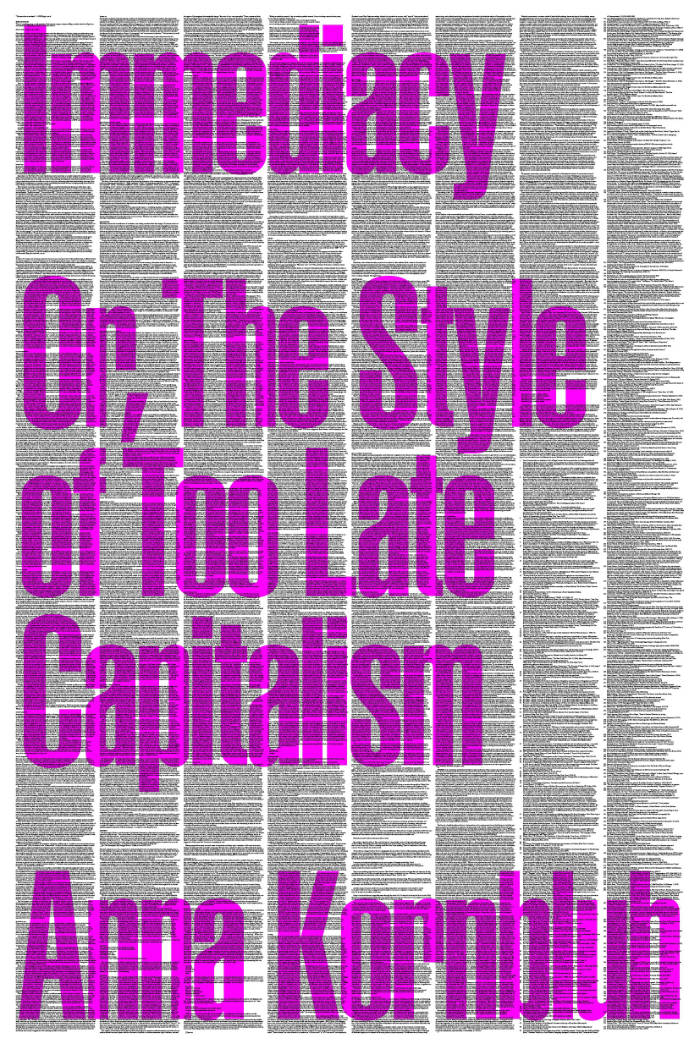
Immediacy: Or, the Style of Too Late Capitalism
Why speed, flow, and direct expression now dominate cultural style.
Contemporary cultural style boosts transparency and instantaneity. These are values absorbed from our current economic conditions of "disintermediation": cutting out the middleman. Like Uber, but for art. Immediacy names this style to make sense of what we lose when the contradictions of twenty-first-century capitalism demand that aesthetics negate mediation. Surging realness as an aesthetic program synchs with the economic imperative to intensify circulation when production stagnates. "Flow" is the ultimate twenty-first-century buzzword, but speedy circulation grinds art down to the nub. And the bad news is that political turmoil and social challenges require more mediation. Collective will, inspiring ideas, and deliberate construction are the only way out, but our dominant style forgoes them.
Considering original streaming TV, popular literature, artworld trends, and academic theories, Immediacy explains the recent obsession with immersion and today's intolerance of representation, and points to alternative forms in photography, TV, novels, and constructive theory that prioritize distance, impersonality, and big ideas instead.

The Last Sane Woman
A beguiling debut novel about friendship and failure, written with unusual craft and spryness by an acclaimed poet
Nicola is a few years out of a fine arts degree, listless and unenthusiastically employed in London. She begins to spend her hours at a university archive dedicated to women's art, because she 'wants to read about women who can't make things'.
There she discovers one side of a correspondence beginning in 1976 and spanning a dozen years, written from one woman – a ceramics graduate, uncannily like Nicola – to her friend, who is living a contrasting and conventionally moored life. As she reads on, an acute sense of affinement turns to obsession, and she abandons one job after another to make time for the archive.
The litany of coincidences in the letters start to chime uncomfortably, and Nicola's feeling of ownership begets a growing what if she doesn't like what the letters lead to?

Black Meme
A history of Black imagery that recasts our understanding of visual culture and technology
In Black Meme, Legacy Russell, awardwinning author of the groundbreaking Glitch Feminism, explores the “meme” as mapped to Black visual culture from 1900 to the present, mining both archival and contemporary media.
Russell argues that without the contributions of Black people, digital culture would not exist in its current form. These meditations include the circulation of lynching postcards; why a mother allowed JET magazine to publish a picture of her dead son, Emmett Till; and how the televised broadcast of protesters in Selma changed the debate on civil rights. Questions of the media representation of Blackness come to the fore as Russell considers how citizen-recorded footage of the LAPD beating Rodney King became the first viral video. Why the Anita Hill hearings shed light on the media’s creation of the Black icon. The ownership of Black imagery and death is considered in the story of Tamara Lanier’s fight to reclaim the daguerreotypes of her enslaved ancestors from Harvard. Meanwhile the live broadcast on Facebook of the murder of Philando Castile by the police after he was stopped for a broken taillight forces us to bear witness to the persistent legacy of the Black meme.
Through imagery, memory, and technology, Black Meme shows us how images of Blackness have always been central to our understanding of the modern world.

Mural
Last poems from the national poet of Palestine.
Mural is the testimony of one of the most important and powerful poets of our age.
Mahmoud Darwish was the unofficial laureate of Palestine. One of the greatest poets of the last half-century, his work evokes the loss of his homeland and is suffused with the pain of dispossession and exile. Here, his close friends John Berger and Rema Hammami present a beautiful new translation of two of Darwish’s later works: his long masterpiece Mural, a contemplation of his life and work written following life-threatening surgery, and his last poem, The Dice Player, which Darwish read in Ramallah a month before his death.
Illustrated with original drawings by John Berger.
Introduction by John Berger
Translated by John Berger and Rema Hammami

A Short History of Trans Misogyny
An accessible, bold new vision for the future of intersectional trans feminism, called "one of the best books in trans studies in recent years" by Susan Stryker.
Why are trans women the most targeted of LGBT people? Why are they in the crosshairs of a resurgent anti-trans politics around the world? And what is to be done about it by activists, organizers, and allies?
A Short History of Transmisogyny is the first book-length study to answer these urgent but long overdue questions. Combining new historical analysis with political and activist accessibility, the book shows why it matters to understand trans misogyny as a specific form of violence with a documentable history. Ironically, it is through attending to the specificity of trans misogyny that trans women are no longer treated as inevitably tragic figures. They emerge instead as embattled but tenacious, locked in a struggle over the meaning and material stakes of gender, labor, race, and freedom.
The book travels across bustling port cities like New York, New Orleans, London and Paris, the colonial and military districts of the British Raj, the Philippines, and Hawai'i, and the lively travesti communities of Latin America.
The book shows how trans femininity has become legible as a fault line of broader global histories, including colonial government, the sex work industry, the policing of urban public space, and the line between the formal and informal economy. This transnational and intersectional approach reinforces that trans women are not isolated social subjects who appear alone; they are in fact central to the modern social world.

Love and Money, Sex and Death: A Memoir
After a successful career, a twenty-year marriage, and two kids, McKenzie Wark has an acute midlife crisis: coming out as a trans woman. Changing both social role and bodily form recasts her relation to the world. Transition changes what, and how, she remembers. She makes fresh sense of her past and of history by writing to key figures in her life about the big themes that haunt us all—love and money, sex and death.
In letters to her childhood self, her mother, sister, and past lovers, she writes a backstory that enables her to live in the present. The letters expand to address trans sisters lost and found, as well as Cybele, ancient goddess of trans women. She engages with the political, the aesthetic, and the numinous dimensions of trans life and how they refract her sense of who she is, who she has been, who she can still become. She confronts difficult memories that connect her mother’s early death to her compulsion to write, her communist convictions, her coming to New York, the bittersweet reality of her late transition, and the joy to be found in Brooklyn’s trans and raver communities.

Hit Parade of Tears: Stories
Izumi Suzuki had ideas about doing things differently, ideas that paid little attention to the laws of physics, or the laws of the land. In this new collection, her skewed imagination distorts and enhances some of the classic concepts of science fiction and fantasy.
A philandering husband receives a bestial punishment from a wife with her own secrets to keep; a music lover finds herself in a timeline both familiar and as wrong as can be; a misfit band of space pirates discover a mysterious baby among the stars; Emma, the Bovary-like character from one of Suzuki's stories in Terminal Boredom, lands herself in a bizarre romantic pickle.

Bad Gays: A Homosexual History
An unconventional history of homosexuality.
We all remember Oscar Wilde, but who speaks for Bosie? What about those 'bad gays' whose unexemplary lives reveal more than we might expect? Many popular histories seek to establish homosexual heroes, pioneers, and martyrs but, as Huw Lemmey and Ben Miller argue, the past is filled with queer people whose sexualities and dastardly deeds have been overlooked despite their being informative and instructive.
Based on the hugely popular podcast series of the same name, Bad Gays asks what we can learn about LGBTQ+ history, sexuality and identity through its villains, failures, and baddies. With characters such as the Emperor Hadrian, anthropologist Margaret Mead and notorious gangster Ronnie Kray, the authors tell the story of how the figure of the white gay man was born, and how he failed. They examine a cast of kings, fascist thugs, artists and debauched bon viveurs. Imperial-era figures Lawrence of Arabia and Roger Casement get a look-in, as do FBI boss J. Edgar Hoover, lawyer Roy Cohn, and architect Philip Johnson.
Together these amazing life stories expand and challenge mainstream assumptions about sexual identity: showing that homosexuality itself was an idea that emerged in the nineteenth century, one central to major historical events.
Huw Lemmey is a novelist, artist and critic living in Barcelona. He is the author of three novels: Unknown Language, Red Tory, and Chubz. He has written for the Guardian, Frieze, Tribune, the Architectural Review, New Humanist, the White Review, and L'Uomo Vogue, among others.
Ben Miller is a writer and researcher living in Berlin, where he is currently a Doctoral Fellow at the Graduate School of Global Intellectual History at the Freie Universität. He has written for the New York Times, Literary Hub, Los Angeles Review of Books, Tin House, and Radical History Review, and is the author of The New Queer Photography. Since 2018 he has been a member of the board of directors of the Schwules Museum, one of the world's largest independent queer museums and archives.

We Want Everything
It was 1969, and temperatures were rising across the factories of the north as workers demanded better pay and conditions. Soon, discontent would erupt in what became known as Italy’s Hot Autumn. A young worker from the impoverished south arrives at Fiat’s Mirafiori factory in Turin, where his darker complexion begins to fade from the fourteen-hour workdays in sweltering industrial heat. His bosses try to withhold his wages. Our cynical, dry-witted narrator will not bend to their will. “I want everything, everything that’s owed to me,” he tells them. “Nothing more and nothing less, because you don’t mess with me.”
Around him, students are holding secret meetings and union workers begin halting work on the assembly lines, crippling the Mirafiori factory with months of continuous strikes. Before long, barricades line the roads, tear gas wafts into private homes, and the slogan “We Want Everything” is ringing through the streets.
Wrought in spare and measured prose, Balestrini’s novel depicts an explosive uprising. Introduced by Rachel Kushner, the author of the best-selling The Flamethrowers, We Want Everything is the incendiary fictional account of events that led to a decade of revolt.
Translated by Matt Holden
Introduction by Rachel Kushner
-575f5a59fae756755c70e16a3f1db7f4.jpg)
The Black Atlantic
In this groundbreaking work, Paul Gilroy proposes that the modern black experience can not be defined solely as African, American, Carribean or British alone, but can only be understand as a Black Atlantic culture that transcends ethnicity or nationality. This culture is thorough modern and, often, overlooked but can deeply enriches our understanding of what it means to be modern.
This condition comes out of historical transoceanic experience, established first with the slave trade but later seen in the development of a transatlantic culture. And Gilroy takes us on a tour of the music that, for centuries, has transmitted racial messages and feeling around the world, from the Jubilee Singers in the nineteenth century to Jimi Hendrix to rap. He also explores this internationalism as it is manifested in black writing from the ‘double consciousness’ of W. E. B. Du Bois to the ‘double vision’ of Richard Wright to the compelling voice of Toni Morrison. As a consequence, Black Atlantic charts the formation of a nationalism, if not a nation, within this shared, disasporic culture.

Abolish the Family: A Manifesto for Care and Liberation
What would it be like to imagine a communism not just of wealth but also of care, love and belonging? Where the full range of human needs are met without depending on the fragile bubble of the nuclear family? That institution we are all supposed to believe will be there for us—even though so many books and films detail all the ways in which it fails. This is the difficult yet important terrain where Sophie Lewis ventures. Abolish the Family is a short, sharp shock to our assumptions about the good life and how to achieve it.
Sophie Lewis is a freelance writer living in Philadelphia, teaching courses for the Brooklyn Institute for Social Research. Her first book was Full Surrogacy Now: Feminism Against Family, and her essays have appeared in the New York Times, Harper's, Boston Review, n+1, the London Review of Books and Salvage. Sophie studied English, Politics, Environment and Geography at Oxford, the New School, and Manchester University, and is now an unpaid visiting scholar at the Feminist, Queer and Transgender Studies Center at the University of Pennsylvania.
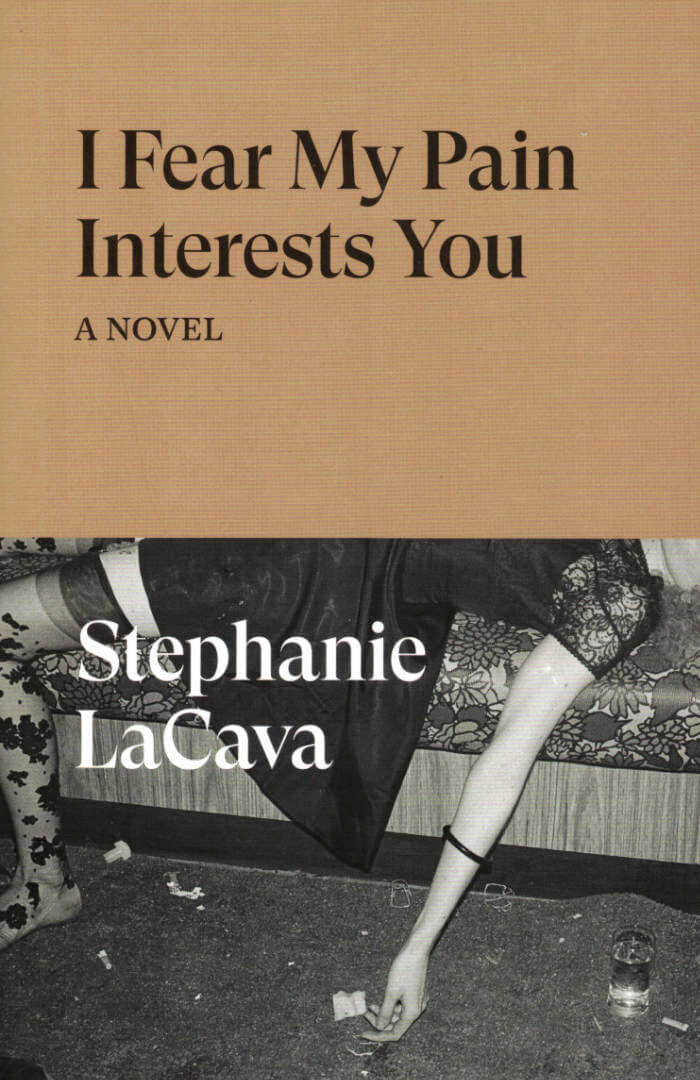
I Fear My Pain Interests You
A punky, raw novel of millenial disaffection, trauma and 1960s cinema.
Margot is the child of renowned musicians and the product of a particularly punky upbringing. Burnt-out from the burden of expectation and the bad end of the worst relationship yet, she leaves New York and heads to to the Pacific Northwest. She's seeking to escape both the eyes of the world and the echoing voice of that last bad man. But a chance encounter with a dubious doctor in a graveyard, and the discovery of a dozen old film reels, opens the door to a study of both the peculiarities of her body and the absurdities of her famous family.
A literary take on cinema du corps, Stephanie LaCava's new novel is an audaciously sexy and moving exploration of culture and connections, bodies and breakdowns.
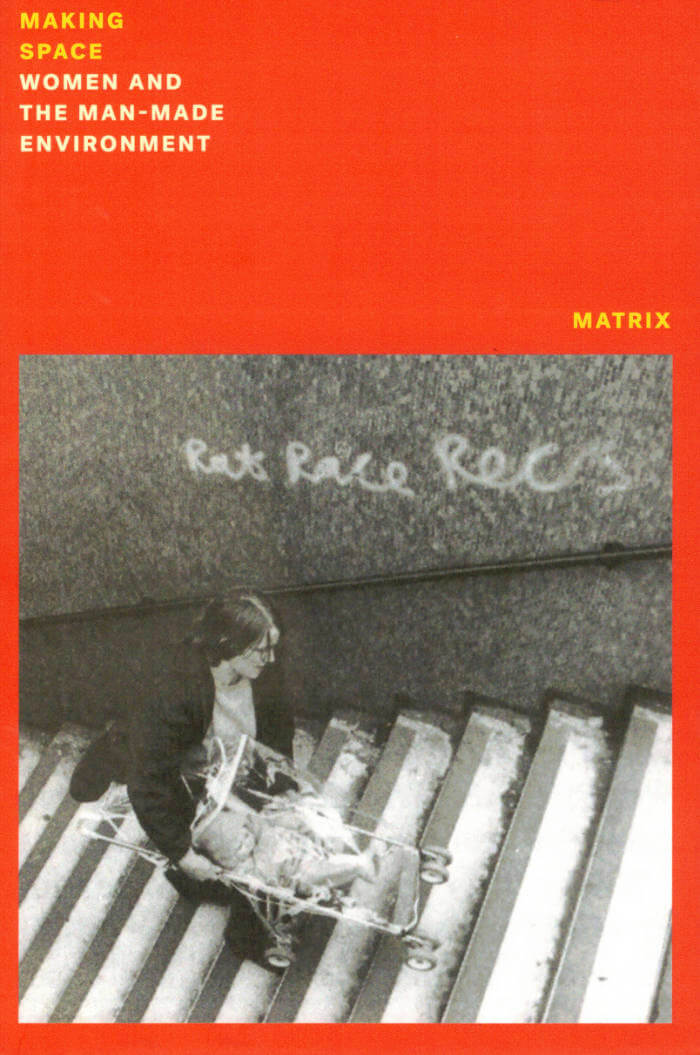
Making Space: Women and the Manmade Environment
Making Space is a pioneering work first published in 1984 which challenges us to look at how the built environment impacts on women's lives. It exposes the sexist assumptions on gender and sexuality that have a fundamental impact on the way buildings are designed and our cities are planned.
Written collaboratively by the feminist collective Matrix, tthe book provide a full blown critique of the patriarchal built environment both in the home and in public space, and outline alternative forms of practice that are still relevant today. Making Space remains a path breaking book pointing to possibilities of a feminist future.
Some authors worked for the London-based Matrix Feminist Architect's collective, an architectural practice set up in 1980 seeking to establish a feminist approach to design. They worked on design projects—such as community, children and women's centres. Others were engaged in building work, teaching and research.
The new edition comes with a new introduction examining the context, process and legacy of Making Space written by leading feminists in architecture.
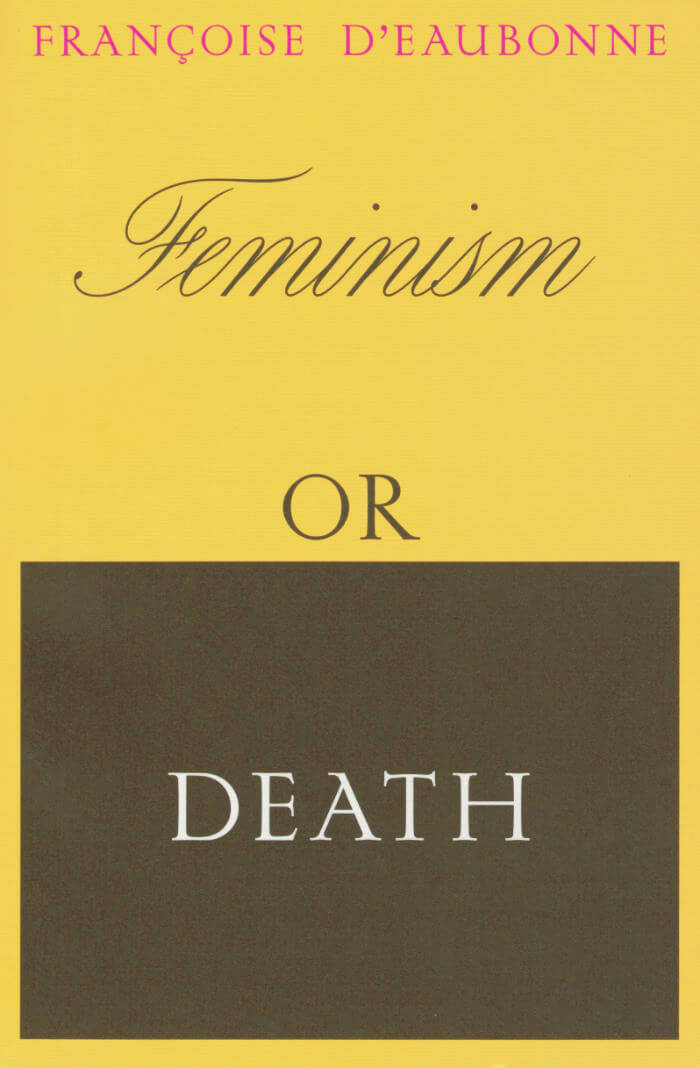
Feminism or Death
Originally published in French in 1974, radical feminist theorist Francoise d'Eaubonne's Feminism or Death surveyed women's status around the globe and argued that an internationalist feminism was not just about equality but about life or death - of humans and also of the planet.
D'Eaubonne first proposed a politics of "ecofeminisme," the idea that the patriarchal system also destroys the environment, and that feminism and environmentalism must be connected.

Terminal Boredom
The first English-language publication of the work of Izumi Suzuki, a legend of Japanese science fiction and a countercultural icon.
In a future where men are contained in ghettoised isolation, women enjoy the fruits of a queer matriarchal utopia—until a boy escapes and a young woman’s perception of the world is violently interrupted.
The last family in a desolate city struggles to approximate twentieth- century life on Earth, lifting what notions they can from 1960s popular culture. But beneath these badly learned behaviours lies an atavistic appetite for destruction.
Nonchalantly hip and full of deranged prescience, Suzuki’s singular slant on speculative fiction would be echoed in countless later works, from Neuromancer to The Handmaid’s Tale. In these darkly playful and punky stories, the fantastical elements are always grounded in the universal pettiness of strife between the sexes, and the gritty reality of life on the lower rungs, whatever planet that ladder might be on.

Humankind: Solidarity with Non-Human People
A radical call for solidarity between humans and non-humans.
What is it that makes humans human? As science and technology challenge the boundaries between life and non-life, between organic and inorganic, this ancient question is more timely than ever. Acclaimed Object-Oriented philosopher Timothy Morton invites us to consider this philosophical issue as eminently political. In our relationship with non-humans, we decided the fate of our humanity.
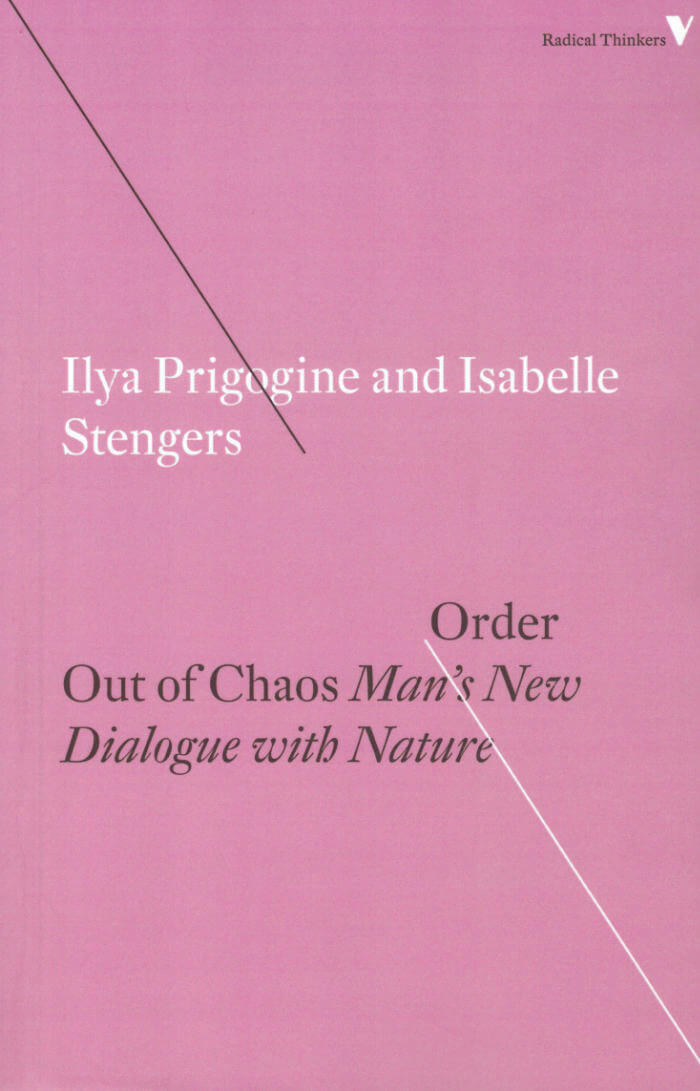
Order Out of Chaos: Man’s New Dialogue with Nature
Ilya Prigogine, Isabelle Stengers
A pioneering book that shows how the two great themes of classic science, order and chaos, are being reconciled in a new and unexpected synthesis.
Order Out of Chaos is a sweeping critique of the discordant landscape created by modern scientific knowledge. An exciting and accessible account of the philosophical implications of thermodynamics, it brings contradictory philosophies of time and chance into a novel and ambitious synthesis. Since its first publication in 1978, this book has sparked debate among physicists, philosophers, literary critics and historians.

The Corona Crash
Free market, competitive capitalism is dead. The separation between politics and economics can no longer be sustained.
In The Corona Crash, leading economics commentator Grace Blakeley theorises about the epoch-making changes that the coronavirus brings in its wake.
We are living through a unique moment in history. The pandemic has caused the deepest global recession since the Second World War. Meanwhile the human cost is reflected in a still-rising death toll, as many states find themselves unable—and some unwilling—to grapple with the effects of the virus. Whatever happens, we can never go back to business as usual.
This crisis will tip us into a new era of monopoly capitalism, argues Blakeley, as the corporate economy collapses into the arms of the state, and the tech giants grow to unprecedented proportions.
We need a radical response. The recovery could see the transformation of our political, economic, and social systems based on the principles of the Green New Deal. If not, the alternatives, as Blakeley warns, may be even worse than we feared.
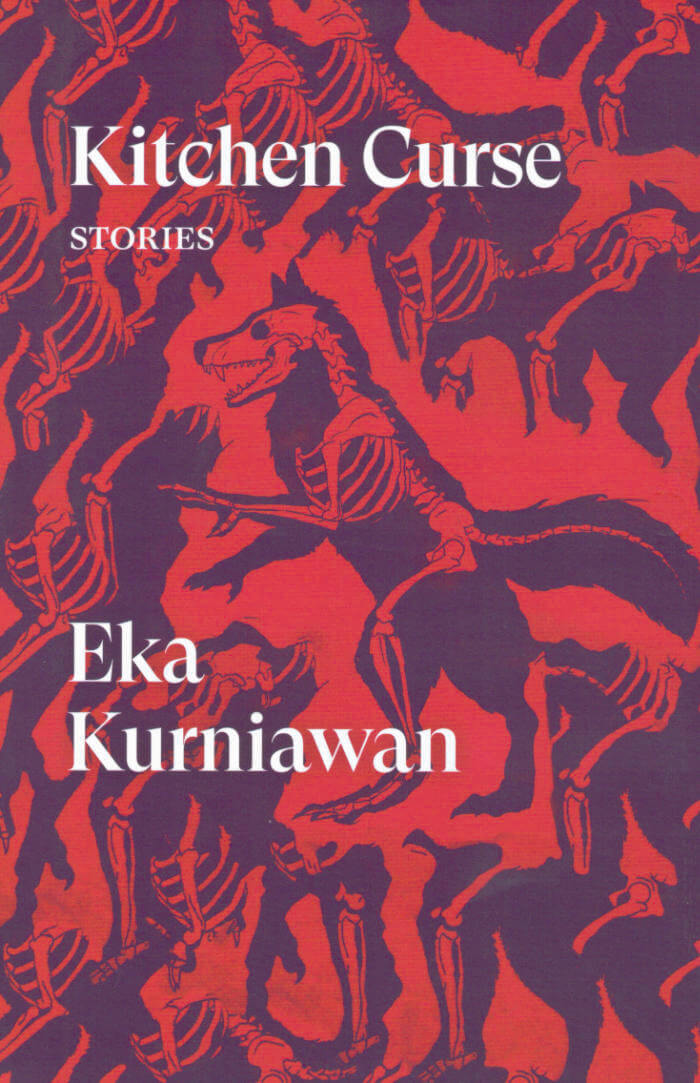
Kitchen Curse
Nominated for the Man Booker International, Eka Kurniawan brings his short stories into English for the first time.
Eka Kurniawan’s freewheeling imagination explores the turbulent dreams of an ex-prostitute, the hapless life of a perpetual student, victims of an anticommunist genocide, the travails of an elephant, even the vengeful fantasies of a stone. Dark, sexual, scatological, violent, and mordantly funny, these fractured fables span city and country, animal and human, myth and politics.
Like nothing else, Kurniawan’s stories bury themselves in the mind. His characters and insights are at once hauntingly familiar, peculiar, and twisted.

The Storyteller
The Storyteller gathers for the first time the fiction of the legendary critic and philosopher Walter Benjamin, best known for his groundbreaking studies of culture and literature, including Illuminations, One-Way Street and The Arcades Project. His stories revel in the erotic tensions of city life, cross the threshold between rational and hallucinatory realms, celebrate the importance of games, and delve into the peculiar relationship between gambling and fortune-telling, and explore the themes that defined Benjamin. The novellas, fables, histories, aphorisms, parables and riddles in this collection are brought to life by the playful imagery of the modernist artist and Bauhaus figure Paul Klee.